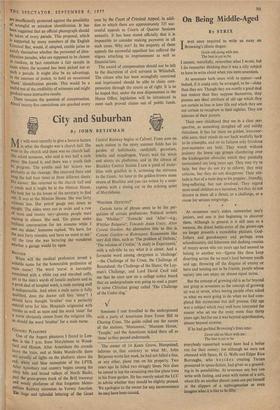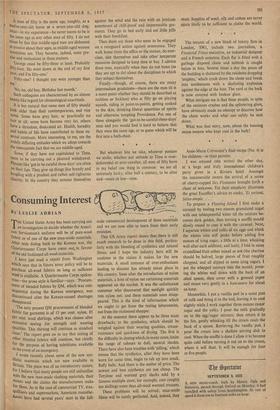On Being Middle-Aged ,
By STRIX
WAS once required to write an essay on I Browning's idiotic slogan :
GroW old along with me; The best is yet to be.
I cannot, mercifully, remember what I wrote, but I do remember thinking that it was a silly subject to have to write about when you were seventeen.
At seventeen both sexes wish to appear—and indeed, if it could only be arranged, to be—older than they are. Though they are mostly a good deal less mature than they suppose themselves, they possess one ideal attribute of old age which they are certain to lose in later life and which they are not certain to recapture in their eighties. They are tolerant of their juniors.
Their own childhood they see in a clear per- spective, as something sloughed off and mildly ridiculous. It has for them no golden, irrecover- able aura; their minds do not hack wistfully back to its triumphs, and on its failures only frivolous post-mortems arc held. They watch without jealousy the lower age groups clambering over the kindergarten obstacles which they painfully surmounted ten long years ago. They may try to help, but they do not try to reform; they may criticise, but they do not disapprove. Their atti- tude is that of a male dog to his puppies : friendly, long-suffering, but not involved. They regard most small children as a nuisance; but they do not discern in them all a threat, or a challenge, or a cause for serious misgivings.
At seventeen one's elders outnumber one's juniors, and one is just beginning to discover them. Although in general it is still seen as a menace, the dread battle-array of the grown-ups no longer presents a monolithic phalanx. God- fathers and gamekeepers and perhaps even schoolmasters, old fishermen and dashing cousins of twenty-seven who ten years ago had seemed to belong to another era—figures like these keep deserting across the no man's land between youth and age, throwing off the disguise of enemy or hero and turning out to be friends, people whose society one can enjoy on almost equal terms.
But the concept of growing old is as far beyond our grasp at seventeen as the concept of growing up was at seven, when boring people often asked us what we were going to do when we had com- pleted this mysterious but dull process. Old age was a subject which may well have interested the master who set me the essay more than thirty years ago; but for me it was beyond apprehension, almost beyond surmise.
If he had garbled Browning's lines into: Grow old on Mars with me : The best is yet to be everybody concerned would have had a better run for their money; for although we were not obsessed with Space, H. G. Wells and Edgar Rice Burroughs, who besides creating Tarzan pioneered in space-fiction, had given us a ground- ing in its possibilities. At seventeen any boy can write with feeling, and even with vision of a sort, about life on another planet; none can put himself in the slippers of a septuagenarian or even imagine what it is like to be fifty. A man of fifty is the same age, roughly, as a twelve-year-old horse or a seven-year-old dog; What—in my experience—he never seems to be is the same age as any other man of fifty. I do not mean by this that middle-aged men are dishonest or evasive about their ages, as middle-aged women sometimes are. They become, indeed, most pre- cise and meticulous in these matters.
'George must be fifty-three at least. Probably fifty-four. He went down at the end of my first Year, and I'm fifty-one.' 'Fifty-one? I thought you were younger than Me.'
'No, no, old boy. Birthday last month.'
Such colloquies are characterised by an almost nanny-like regard for chronological exactitude.
It is but natural that some men of fifty should look older than their contemporaries, and vice Versa. Some have grey hair, or practically no hair at all; some have become very fat, others have a shrunken, desiccated air. Health, heredity and habits of life have contributed to these ex- ternal contrasts. More interesting, to me, are the widely differing attitudes which we adopt towards the inescapable fact that we are middle-aged.
Some, if they have not capitulated to Time, seem to be carrying out a" planned withdrawal. Phrases like 'got to be careful these days' are often on their lips. They give up things like brandy and heagling with a prudent and rather self-righteous alacrity. In the country they armour themselves against the wind and the rain with an intricate assortment of chill-proof and impermeable gar- ments. They go to bed early and eat little pills with their breakfast.
Then there are those who seem to be engaged on a rearguard action against senescence. They walk home from the office or the station, do exer- cises, diet themselves and take other temperate measures designed to keep time at bay. I admire these men, especially when they do not boast (as they are apt to do) about the disciplines to which they subject themselves.
Finally—though, of course, there are many intermediate gradations—there are the men (it is a moot point whether they should be described as reckless or feckless) who at fifty go on playing squash, riding in point-to-points, getting soaked to the skin, drinking liberal quantities of spirits and otherwise tempting Providence. Put one of these alongside the 'got-to-be-careful-these-days' man and you would find it hard to believe that they were the same age, or to guess which will be first into a bath-chair.
But whatever line we take, whatever posture we strike, whether our attitude to Time is over- deferential or over-cavalier, all men of fifty have in my belief one thing in common : we are all extremely lucky, after half a century, to be alive and—more or less—sane.

































 Previous page
Previous page